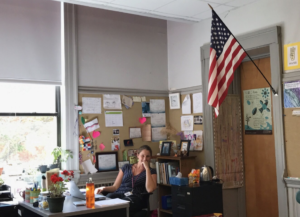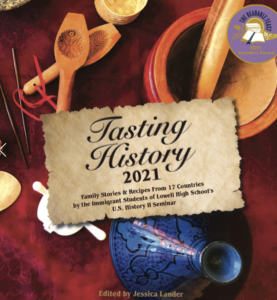Jessica Lander
History Teacher
Lowell High School
What inspired you to incorporate food into your curriculum?
 I have the honor of teaching history and civics to extraordinary immigrant and refugee teenagers hailing from more than thirty countries. Each year my U.S. History students write a cookbook of family recipes passed down through generations and share their reflections on their migration journeys—memories of far away homelands and dreams of American futures. The project is the culmination of our study of immigration from the late 1800s and early 1900s. We reflect on Emma Lazarus’s poem at the base of the Statue of Liberty; we read the poems written by immigrants into the walls of Angel Island in San Francisco; we study laws that attempted to exclude—the Chinese Exclusion Act, the Johnson Reed Immigration Act; and we discuss how those laws were ultimately overturned, allowing America to welcome immigrants once more.
I have the honor of teaching history and civics to extraordinary immigrant and refugee teenagers hailing from more than thirty countries. Each year my U.S. History students write a cookbook of family recipes passed down through generations and share their reflections on their migration journeys—memories of far away homelands and dreams of American futures. The project is the culmination of our study of immigration from the late 1800s and early 1900s. We reflect on Emma Lazarus’s poem at the base of the Statue of Liberty; we read the poems written by immigrants into the walls of Angel Island in San Francisco; we study laws that attempted to exclude—the Chinese Exclusion Act, the Johnson Reed Immigration Act; and we discuss how those laws were ultimately overturned, allowing America to welcome immigrants once more.
When, back in 2017, I began writing the curriculum for our exploration of 19th century immigration I was struck by all the activities and lesson plans I found online that started with some version of “Imagine you had to leave your home?” “Imagine you were coming to a new country…” My students don’t have to imagine. My students are experts. Having studied the journeys and experiences of the 19th century immigrants, I ask my students to share their 21st century migration stories – to become our teachers.
 The Tasting History Project has become a powerful way to connect the stories and experiences of immigrants of the early 20th century with the stories and experiences of my immigrant students in the 21st century. We begin the project by exploring global food traditions. Then my students set about choosing a favorite recipe. They must go home and ask their family how to make it. They talk to moms and dads, they call grandfathers in Brazil and aunts in Cambodia. Having collected the recipes, we write and edit, and edit, and edit. Students go through upwards of ten rounds of edits making their writing stronger and more precise. For students still mastering English, this is a powerful opportunity to iterate, practice, and strengthen their writing. Next they turn to writing narratives about their journeys as immigrants. They trace the history of dishes, share stories about the connections between cultures and foods, and reflect on their own migration to the United States. As we do this we make connections between their stories and those we have studied from a hundred years ago.
The Tasting History Project has become a powerful way to connect the stories and experiences of immigrants of the early 20th century with the stories and experiences of my immigrant students in the 21st century. We begin the project by exploring global food traditions. Then my students set about choosing a favorite recipe. They must go home and ask their family how to make it. They talk to moms and dads, they call grandfathers in Brazil and aunts in Cambodia. Having collected the recipes, we write and edit, and edit, and edit. Students go through upwards of ten rounds of edits making their writing stronger and more precise. For students still mastering English, this is a powerful opportunity to iterate, practice, and strengthen their writing. Next they turn to writing narratives about their journeys as immigrants. They trace the history of dishes, share stories about the connections between cultures and foods, and reflect on their own migration to the United States. As we do this we make connections between their stories and those we have studied from a hundred years ago.
Finally they cook their dishes, often having to learn from family, and bring those dishes in for their classmates to try. Weeks later we publish their cookbook of recipes and stories of migration and share the cookbook in the community, and each student receives a copy. https://bit.ly/TastingHistoryFamilyStoriesandRecipes
How were you able to connect with Lowell’s Food Service Director in order to bring your student’s recipes to life in the cafeteria?
In December of 2021 I got a really exciting email from Alysia Spooner-Gomez, General Manager Food and Nutrition, Lowell Public Schools asking to collaborate with our class. She and Head Chef Michael Emmons had read about how my students had been awarded the 2021 Founders Award by Readable Feast,a highly respected contest for professional chefs and restaurants for their cookbook published during the pandemic. From our first meeting, they were all in! Every month, having selected one of our students’ recipes from our newly published cookbook, Chef Michael joined our class. He shared with us his interpretation of one of my students’ recipes, accounting for school nutrition guidelines and available ingredients, so that we could all taste and he asked my students for feedback and recommendations. After my students gave their approval, the dish was then served across the district to more than 14,000 students.
It’s been really powerful to watch my extraordinary immigrant students and Lowell Food Services come together to share delicious foods from around the globe with the community. And it’s been powerful to watch my extraordinary immigrant students become teachers in our community.
What are some ways your students have benefitted from being involved in this project? How does teaching about food and food systems build connections in your classroom and school community? And what do you feel are your program’s biggest successes?
Over the years, the Tasting History Project has grown into such a powerful part of our classroom work and also our work in the community. My hope is that the Project helps create space to ensure that my immigrant students understand that their history is an important part of this country’s history. And that we all have so much to learn from them. The project also allows us to center my students’ families and their knowledge and expertise in our classroom. Food brings people together. Sharing family recipes and stories builds connections between my students in our class and also with my students and our larger community.
In addition to serving my students favorite family recipes across the district, this year third graders in Lowell will be studying my students’ Tasting History cookbooks as part of one of their social studies units. In preparation my students, with the help of the film studio at our school, create videos for their younger peers –sharing with them, in English and in their home languages, their food, their stories of migration, and their histories.
In the last year, the collaboration with the Lowell Food Services and with the district has been just extraordinary, for which I’m so grateful. They have been truly amazing, in reaching out, embracing, and lifting up my students’ work. And it has been so powerful to see how my students are being recognized as important teachers in our community.
I see the impact in the cafeteria, as I watch students excitedly dig into my students Nempisey and Samnang’s Cambodian Lok Lak. “I’ve been waiting for this for so long,” I overheard a student say to a friend. Another turned to a friend “honestly, that was the best food I ever had at this school!” I have seen the impact on social media as the community has embraced their stories, histories, and food, with comments including: “Wow..I should move to Lowell so my son can go to school there.” “This makes me a proud Lowellian!” “My student chose this meal for their positive moment for the day.” “Can I go back to hs for this?” And my students themselves share with me how proud they are.
The choices our schools make–including in the histories we teach, or the food we serve–are all signals to our immigrant-origin students, to all students of what is valued. And for this reason, the collaboration with the district has been particularly, deeply meaningful, for as my students tell me, they are seeing their food, their culture, their family traditions, their history celebrated and valued in our school and in our community.
How can other educators get started on developing a project of this kind? What are the first steps?
I would be thrilled to talk with teachers and other educators who are interested in creating a version of The Tasting History Project with their students or school. Indeed the idea for the project is one I borrowed from my own 7th and 8th grade teacher.
Key things that helped us was creating time and space for this project. First students will need time to talk to family, or sometimes call family to collect recipes. Then once we are writing my students go through roughly ten rounds of edits. Iteration is essential. So much powerful learning happens when students have a chance to work on one piece of writing over many many drafts and turn it from okay to good to great. Important to the project too is the fact that we are sharing this project outside of the classroom. Because my students know that we are creating a published cookbook that will be shared in the community I see them every year take their work deeply seriously. And in the end they come away from the project having become published authors!
In terms of collaboration, I feel so grateful to have had so many amazing people in the district reach out wanting to collaborate with my students. But I would say, don’t be shy about reaching out – maybe invite the kitchen team to be guest speakers in your classroom or take a tour of the school kitchen. Talk with school and district leadership about ways you can showcase your students’ final projects in the school or maybe at a community reading.
And again, I would love to hear from other educators to share ideas, to learn from the important work you are doing in your community, and to think about ways we could collaborate.
We heard you just published a new book! Can you tell us a little about it?
Absolutely! Three years ago, in 2019, I set forth from my classroom to begin work on a book, Making Americans: Stories of Historic Struggles, New Ideas, and Inspiration in Immigrant Education. Making Americans explores the past, present, and personal aspects of immigrant education in this country. For years I have been so inspired my my extraordinary immigrant and refugee teenagers. The longer I taught, the more I wondered what approaches educators elsewhere were taking to support immigrant students. And so I set out to learn from others — visiting innovative schools working to support immigrant-origin students, delving into the history of our country’s approaches to immigrant education, and learning from my own remarkable former immigrant students. To reimagine how our country can better educate newcomer children, I believe we need to understand our past, explore present innovations, and listen to the personal stories of young people themselves. Making Americans was just published this October and I’m really excited to share these powerful stories with colleges and communities in the Commonwealth and beyond.
Phone: (413) 253-3844
Email: info@massfarmtoschool.org